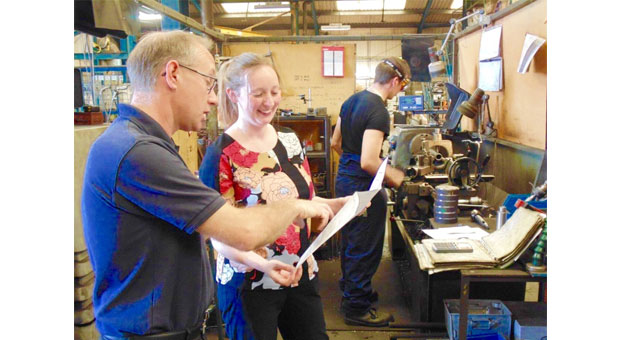
Traditional approaches to competitive advantage are no longer enough, particularly for SME’s. British design and manufacturing companies are having to respond to the challenges surrounding concepts such as Industry 4.0 and the Internet of Things. More than ever before, British Manufacturers are looking for better ways to increase productivity, innovation and deliver repetitive advantage.
Mechanical Engineer, Jocelyn Cole of Penny Hydraulics Ltd has been at the forefront of a pioneering design automation project that has not only seen the company’s manufacturing capability increase by 40% and turnover increase by 60%, but is now also being rolled out as a model for manufacturing companies nationwide to offer smarter working processes and to enable increased operational effectiveness.
Penny Hydraulics is a manufacturer of lifting equipment, based in Chesterfield. The company design, manufacture, install and service a wide range of lifting equipment including goods lifts with a commercial customer base ranging from high street retailers including Arcadia Group and Boots, to tyre suppliers such as ATS Euromaster, nuclear operation contractors such as Magnox and Sellafield and breweries and pub chains including JD Wethersoon, Young’s and Fullers.
After a record year in sales for Goods Lifts in 2015, the company had an increasing demand for bespoke lifts and Jocelyn needed to speed up the design process. Historically at Penny Hydraulics, manufacturing drawings were done by choosing the closest base model from a selection of templates which was time consuming as there were a large number of variations. It was necessary to find a previous installation of the exact same specification to copy. With a large number of variations including; the number of stops, mast type, position, loading direction, guard arrangement, gate type and the possibility of split panels dependent on the lift size, this was no easy task. It would then be necessary to copy the design to a project specific folder and make further changes at this point to finesse the design.
In various attempts over the years to make this process as quick as possible, the model was created by a frame generator meaning the base block could be modified to the appropriate width, depth & height, which would then amend the frame. This was not the most sophisticated process as a lot of manual checking was required. If one of the templates matched the layout exactly this worked well, but if any changes were required this would be very time consuming.
There was then a separate cutting, drilling, mesh list, produced in excel, which was completely independent of the model. So again, there was a significant level of manual intervention. A job card had to be manually filled in with a picking list so the number of frames and lift sections were itemized and ticked off at dispatch. At the time of putting the business case together for the software, there were 15 mezzanine lifts on order of which nine were completely bespoke.
In conjunction with Autodesks leading UK partner Symetri, Jocelyn created a new process which was implemented using iLogic; a rules based productivity tool for engineers. Using iLogic, Jocelyn set up a system which enabled designs to be re-used and repetitive tasks in Inventor to be automated. A fast, simple interface allowed her to create smart components, design tools and configurations, enabling her to quickly create goods lift drawings by picking from various options and categories.
Since using the new process, initial enquiry drawings have been reduced from 20 minutes, for the drawing and specification sheet, down to 2-3 minutes for configuration. This exports both the drawing and the specification sheet. The manufacturing drawings are down to 5 -10 minutes of adjustments once the parameters are imported, from 2 hours previously.
Where previously decisions had been done in an ad hock approach, such as when to split a panel, or put in a cross beam for mesh support, Jocelyn had to make rules to drive this leading to standardization. On the back of this, she was then able to look at ways to speed up manufacture, including having parts laser cut, bent and pressed.
In the past the company had the same personnel manufacturing, so there had been a reliance on them knowing how to create certain items, which was limiting when considering taking on additional resources. Now that there are detailed drawings for all items, the company division has increased manufacturing capability by 40%. Turnover has increased 60%, resulting in a nett profit increase of 140%. Nett profit this year is 19.9%.
Jocelyn, based in North Lincolnshire studied at Sheffield Hallam University, completing a degree in Mechanical Engineering, going on to study an MBA in Industrial Management in 2010. As a result of this latest project, she is taking part in The Future of British Manufacturing Initiative. The initiative comprises of a roadshow where the focus is on gaining a better understanding of the trends that are shaping the design and manufacturing industry, learning how other companies are responding to them. Jocelyn has been appointed as speaker at the event on June 15th at AMRC, Rotherham and will be discussing her approach to design automation and the benefits this has had for the company.
Penny Hydraulics have just been awarded “Family Business of the Year” at the Family Business Awards which took place at the Mayfair Hotel in London on June 2nd 2016. This pioneering project was a huge contributor to this success as the judges commented on the companies innovation, investment and support and promotion of the engineering sector in the UK.